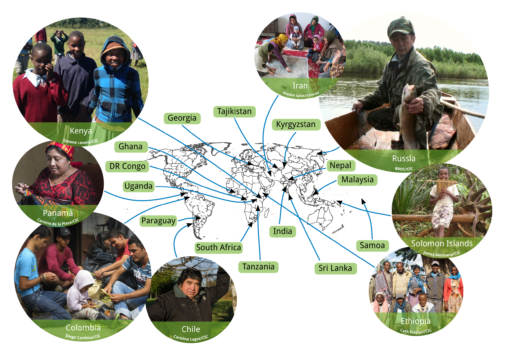
Conserving biocultural diversity and respecting and promoting the rights and role of Indigenous Peoples, local communities and women in nurturing biocultural diversity is of fundamental importance to reducing and reversing deforestation and biodiversity loss in general. Indigenous Peoples and Local Communities’ Conserved Territories and Areas (ICCAs) cover 12-22% of the earth’s territory. There is convincing evidence that ICCAs not only sustain many unique cultures and livelihoods, but that they are also far more effective at forest conservation and restoration than conventional protected areas. It is also broadly recognised that Indigenous Peoples and Local Communities (IPLCs) play a central role in the implementation of ecosystem conservation and restoration strategies on the ground. Together with other members of the ICCA Consortium we promote the legal and political recognition of ICCAs and the autonomous governance structures and rights of the communities that manage them.
The Community Conservation Resilience Initiative
The aim of the Community Conservation Resilience Initiative (CCRI) was to contribute to the implementation of the CBD’s 2011-2020 Strategic Plan and Aichi Targets by providing policy advice on effective and appropriate forms of support for community conservation (see CCRI methodology). The project has documented and reviewed the findings of bottom-up, participatory assessments in 22 countries (see map below) of the resilience of community conservation initiatives and the support that should be provided to strengthen these initiatives. The results of the assessments are being widely disseminated and fed into the deliberations of the Convention on Biological Diversity and related international policy processes through an active outreach and advocacy campaign. You can view and download all of the CCRI publications to date here. The project ran until April 2019, and numerous CCRI projects led to inspiring results, teaching us a great deal about the best ways to design, develop and implement community conservation projects.
Where did CCRI assessments take place?
Key campaign resources
Community Conservation Resilience Initiative (CCRI) Global Report and Case Studies
Community Conservation Resilience Initiative (CCRI) Full Country Reports
Community Conservation Resilience Initiative (CCRI) Preliminary Report
Community Conservation Resilience Initiative Legal Review
Community Conservation Resilience Initiative (CCRI) toolkit
Community Conservation Resilience Initiative Training Toolkit
Community Conservation Resilience Initiative: Methodology
Climate Finance, Results-based Payments and Conservation by Indigenous Peoples and Local Communities
SDG Policy Brief: Biodiversity Conservation
Briefing Paper: Mainstreaming Biodiversity and the Resilience of Community Conservation
Forest Cover 57 – 1.5°C from a community perspective
Forest Cover 56 – Community conservation in Africa
Forest Cover 51 – Mainstreaming biodiversity? Mainstream equity and justice
Forest Cover 48: Community Conservation Special Edition
Documents for policy makers
Policy recommendations for the Convention on Biological Diversity Conference of the Parties 14
Policy Recommendations for CBD SBSTTA-22 and SBI-2
Policy Recommendations for CBD SBSTTA-21 and WG8(j)-10
Submissions to the Convention of Biodiversity
For blogs, press releases and other resources, see below…

